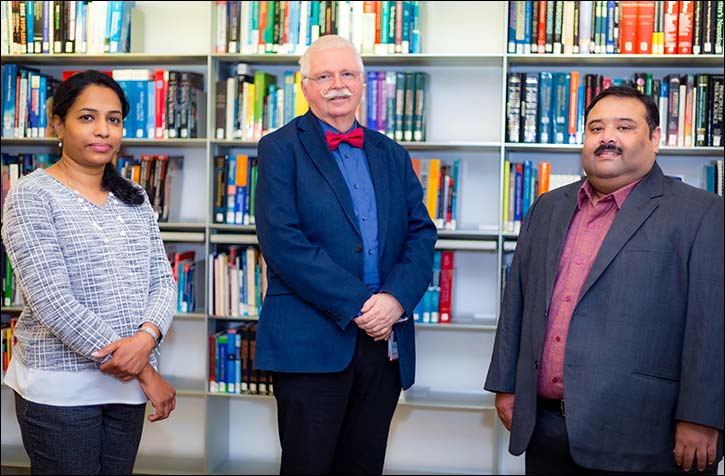
WCM-Q researchers probe links between insulin resistance and colorectal cancer
Doha – May 17, 2025: Researchers at Weill Cornell Medicine-Qatar (WCM-Q) have explored the possible links between insulin resistance and early-onset colorectal cancer (EOCRC) in a new article published in Cancer Cell (Cell Press), a leading scientific journal.
Cancer, regardless of type, is generally considered a disease that occurs later in life, typically after 50-60 years of age. Data from the Surveillance, Epidemiology, and End Results (SEER) Program of the National Cancer Institute (NCI), USA, indicates that the median age of a cancer diagnosis is 66. However, more recently, younger individuals under the age of 45-50 have been diagnosed with cancers (early-onset cancers; EOCs).
Although this shifting trend in cancer epidemiology has been reported previously, this occurrence gained significant attention in early 2024, with many major news outlets and research/medical institutions reporting a rise in EOCs. Among the various EOCs, gastrointestinal cancers, particularly colorectal cancer (CRC), seem to be rapidly increasing among the younger population. This trend appears similar for countries in the MENA region, including Qatar.
'As cancer researchers, we were captivated by the question of 'why this is happening?'' said Prof. Dr. Dietrich Büsselberg, professor of physiology and biophysics, one of the co-corresponding authors of the article. 'It is well known that genetic mutations that cause CRC and hereditary CRC-associated syndromes are highly penetrant and increase the risk of CRC. However, it is unlikely that this risk factor alone has changed so dramatically in successive generations of the population to account for the significant increase in EOCRC in recent years.
Dr. Samson Mathews Samuel, research associate in physiology and biophysics and co-corresponding author of the article, said: 'Our in-depth review of existing literature led us to identify a possible culprit behind this occurrence, namely insulin resistance. Our study, therefore, examined the mechanisms through which insulin resistance may facilitate the development of colorectal cancer, particularly in younger populations.'
A growing body of evidence points to insulin resistance, a hallmark of common metabolic diseases such as obesity, diabetes, and metabolic syndrome, as a possible key risk factor contributing to the incidence and progression of EOCRC. Insulin resistance, defined as the inability of cells to respond to normal insulin, results in hyperinsulinemia (an increase in circulating insulin levels in the blood) much earlier in life than is typically recognized. This is because the possible early signs of insulin resistance usually go unnoticed, and blood tests for insulin resistance are not commonly done as a routine screening measure unless obesity, pre-diabetes/diabetes, or metabolic syndrome have been diagnosed. While several studies link obesity, diabetes, and metabolic syndrome to the risk and progression of CRC, insulin resistance as a risk factor in its own right is often overlooked.
Surprisingly, insulin resistance can drive metabolic changes very early in life and depends on several early-life external factors to which the individual is exposed. 'For example, the overuse of antibiotics or supplements disrupts the microbiome of a pregnant mother, leading to insulin resistance that could also affect the fetus,' said Prof. Busselberg. Environmental factors and minor dietary and lifestyle choices may contribute to insulin resistance, which can play a role in the occurrence of EOCRC.
Ms. Elizabeth Varghese, a senior research specialist, is the other author of the paper, titled 'Complexity of insulin resistance in early-onset colorectal cancer'. The paper also infers that managing insulin resistance through dietary and/or lifestyle changes and therapeutic interventions is likely to be effective in reducing the incidence of colorectal cancer among young individuals.
The study was made possible through funding from the Biomedical Research Program at Weill Cornell Medicine-Qatar and NPRP-Standard (NPRP-S) 14th Cycle grant NPRP14S-0311-210033 from Qatar National Research Fund (a member of Qatar Foundation).
Home >> Healthcare and Fitness Section
Msheireb Properties Wins “Best Luxury Residential Development” and “Best Luxury ...
GTA: To date, exemptions exceeding QAR 900 million for more than 4,000 taxpayers ...
B-lounge doha celebrates the summer season with an enticing new b-lunch set menu
G-SHOCK's Summer Style Statement: Metal-Cased Watches That Define the Season
Msheireb Museums Unveils 2025 Summer Programme: Encouraging Creative Expression ...
MEEZA Signs Agreement with a Global Hyper-scaler to Utilize the Under-Constructi ...
Education Above All Foundation and Inter- American Development Bank Launch $100 ...
Keeta Sets Stage for Qatar Market Entry with Exclusive Founding Vendor Program f ...
Passenger Growth Hits 5% in May
Nasser Bin Khaled Automobiles Hosts Private Screening of 'F1: The Movie' In coll ...
May Air Cargo Demand Up 2.2% Despite Trade Disruptions
Qatar Insurance Group Earns MSCI's Highest ESG Rating, Cementing Its Leadership ...
Zulal wellness resort partners with qatar airways privilege club to offer exclu ...
Education Above All Foundation Announces New Collaboration with the American Cha ...
Auto Class Cars Launches its Special Summer offer on Maxus D60 and D90 max SUVs
Qatar Automobiles Company – FUSO: Driving Progress Across Industries in Qatar
Dukhan Bank Ranks #62 on Forbes Middle East's Top 100 Listed Companies for 2025
Nissan hosts world premiere of all-new Patrol NISMO in the Middle East, elevatin ...
The Mitsubishi Montero Sport.. Attractive design, High Performance and Durable
Hibrid and Alibaba Cloud Sign MoU to Deliver Advanced Streaming and Comprehensiv ...


